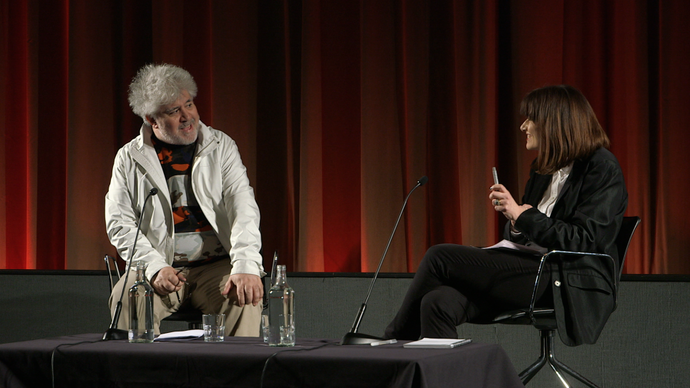Project information

Professor Maria Delgado’s research on Spanish and Latin American cinema and performance has both generated and been developed through numerous collaborations with filmmakers, distributors, film programmers, and festivals. These partnerships have led to wide-ranging and intersecting impacts on creative and industry practices in the culture and heritage sectors.
New ways of thinking about creative practice that have enabled film programmers, distributors, and artists to reach UK audiences
Delgado’s research-led collaborations with film programmers have influenced their professional practices, developing new UK audiences for Spanish-, Basque-, Galician-, and Catalan-language features and documentaries often marginalised in a cultural sector dominated by Anglophone productions. She has worked as programming advisor for the UK’s biggest film festival of its kind, the BFI London Film Festival (LFF), and a consultant for the Institute of Contemporary Arts (ICA), the London Spanish Film Festival, and UK-based film distributors Network Distributing, New Wave, and Second Run. Her advocacy ensured successful UK distribution following LFF screenings of Carla Simón’s Summer 1993 and Lila Avilés’ The Chambermaid, and 34% of the films Delgado has programmed have been picked up for distribution in the UK or on streaming platforms. Joana Granero, Director of the London Spanish Film Festival, testifies to the impact of Delgado’s research in ‘providing audiences with access to work that might not otherwise be seen in the UK’, while Nico Marzano, the ICA’s Head of Cinema, testifies that ‘Latin America Monthly’ (initiated by Delgado) has been crucial in bringing ‘contemporary and often in the UK unknown’ films to London audiences.
Enhancing cultural understandings of cinema from Spain and Latin America
Delgado’s research has had significant impact in enhancing cultural understanding of Spanish- and Catalan-language artistic production. Tim Beddows, Managing Director of Network Distributing Ltd, considers Delgado ‘pivotal in our promotional efforts to bring Latin American cinema to the UK’. Likewise, for Mehelli Modi, the founder and Managing Director of Second Run, UK distributors of international independent cinema: ‘Delgado has always been at the top of my list for someone to host conversations with filmmakers because her research is so effective in enabling cultural understandings of their work, rooted in their particular cultural contexts and creative processes’. Delgado’s activities in this area include: introducing 11 films and conducting over 60 public Q&As and masterclasses with Iberian and Latin American filmmakers from Mariano Llinás to Pedro Costa, as well as LFF Screen Talks with Lucrecia Martel on the premiere of Zama (2017) and Alfonso Cuarón (2018) for Roma. Beddows concludes that ‘the overarching effect of her involvement has been to significantly enhance cultural understandings of materials from non-Anglophone languages’.
New cultural artefacts in Spain and Argentina
In addition to enhancing cultural understandings, Delgado’s research has contributed to the production of new cultural artefacts. Her research on the Spanish actress María Casares led to an invitation to contribute to a new TVE2 (Spanish National Television) documentary on Casares, El todo o la nada. Produced as part of TVE2’s award-winning Imprescindibles series and broadcast on 29 December 2019, the documentary remains available on the RTVE website.
Delgado’s collaboration, as part of the ‘Staging Difficult Pasts’ project, with Buenos Aires ESMA Memory Museum (the site of a clandestine centre of detention and torture during the 1976–1983 military dictatorship) has led to dramaturgical input into a new film produced by El Pampero Cine. Invited by ESMA’s Museum Director, Alejandra Naftal, to curate one of the Museum’s monthly 5 o’clock visits — exploring new ways of thinking about the museum’s collection for visitors — Delgado and Cecilia Sosa brought into artistic dialogue testimonies from a Spanish verbatim play based on the 2012 trial of Judge Baltasar Garzón (for investigating forced disappearances during the Spanish Civil War and its aftermath) and those from Argentine blood relatives of disappeared persons in ESMA’s archive of the trials. Delgado and Sosa’s collaborative dramaturgy and curation of the testimony, working with Argentine film director Alejo Moguillansky, resulted in a 20-minute film which now forms part of the Museum’s collection. The Director of Argentina’s National Archive of Memory, Mariana Tello, confirms the impact of this intervention: ‘It was very transformative; bringing together worlds that appear separated by spatial and temporal distance’, such that the testimonies ‘no longer seem to be something pertaining to the [specific] victim but something that belongs to all of us’.
